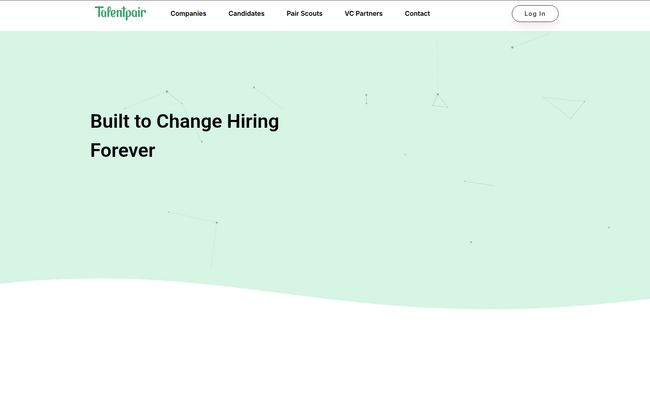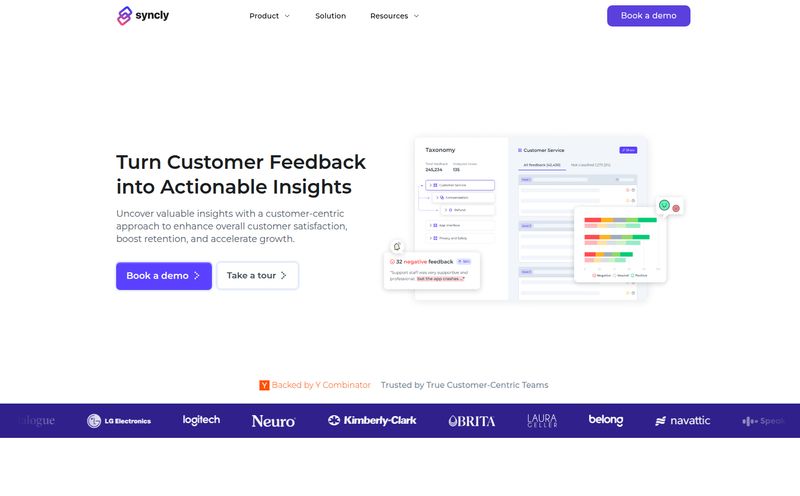Hiring is a nightmare. It just is. I've been in this game for years, building teams, generating traffic, and trying to find the right people to make the magic happen. And for every great hire, there's a story of a dozen candidates who ghosted, a hundred resumes that missed the mark, and an agency fee that made my eyes water.
We’ve all been there. You post a job, brace for the deluge of applications, and then spend what feels like an eternity sifting through resumes that look like they were written by the same generic template. It’s a full-time job on top of your full-time job. So when a platform comes along with a bold claim like “Built to Change Hiring Forever,” my inner skeptic immediately sits up and pays attention. That platform is Talentpair.
I’ve seen a lot of HR tech come and go. Some are just glorified spreadsheets, others promise the world and deliver a pamphlet. But Talentpair, which has been around since 2017, seems to be hitting a different note. They’re not just selling software; they’re selling a streamlined process, an AI-powered partner designed to stop the bleeding. So, is it just another drop in the HR tech ocean, or is it the life raft we’ve all been waiting for?
What Exactly is Talentpair Supposed to Be?
At its core, Talentpair is an AI-powered recruiting platform. But that’s a bit of a buzzwordy mess, isn’t it? Think of it less like a simple job board and more like a recruiting co-pilot. It’s designed to automate the grunt work—the sourcing, the initial screening, the endless back-and-forth of scheduling—so you can focus on the human part: actually talking to qualified, interested people.
They talk a big game about their proprietary data and domain-specific AI models. What this means in plain English is that their system is supposedly smart enough to understand the difference between a Java developer who’s worked on enterprise finance apps and one who’s built mobile games. That nuance is everything.
The whole idea is to cut down that dreaded “time-to-hire” metric and, in the process, save you a chunk of change. They’re positioning themselves as a partner, especially for startups and tech companies (you can see brands like Flodesk and Rapid on their homepage) that need to move fast without sacrificing quality.

Visit Talentpair
The Big Promises: Faster, Cheaper, Better Hires
So, how do they claim to do it? It boils down to a few key pillars I’ve gleaned from their site.
Automation That Actually Helps
Talentpair promises a “Fully Automated” process. This isn’t about replacing your judgment, but about eliminating the tedious steps. Instead of you manually filtering hundreds of resumes, the AI does the first pass, matching skills and experience to your job description. It’s like having a junior recruiter who works 24/7, never needs coffee, and has scanned millions of data points. This is where you get the “Faster Results with AI.” The goal is to get a shortlist of solid candidates in your hands, quick.
A One-Stop Hiring Shop
One of my biggest pet peeves is juggling tools. An ATS for tracking, a calendar plugin for scheduling, email for communicating... it's a mess. Talentpair claims to have “Everything Built Into One System.” From a custom-branded job board that makes you look professional (super important for smaller companies competing for top talent) to integrated interview scheduling, it aims to be the single source of truth for your hiring process. This consolidation is a massive quality-of-life improvement.
A Different Kind of Payment Model
This part is interesting. They emphasize that you “Only Pay for What You Need.” When you make a hire, you pay a placement fee. This feels like a hybrid between a traditional recruiter and a SaaS tool. And the “No Long-Term Commitment” line is a breath of fresh air. It feels like they’re confident enough in their product that they don’t need to lock you into a scary annual contract. They believe you'll get results and stick around because you want to. It's a bold strategy, Cotton. Let's see if it pays off for them.
The Pricing Puzzle: What's the Real Cost?
Okay, let's talk about the money. The pricing page doesn't give you a number. This is typical for platforms targeting businesses rather than individuals, but it's still something to be aware of. They offer “Partnership Pricing Tiers” with two main options: Platform and Custom.
Here’s a quick breakdown of what you seem to get with both:
| Feature | Platform Plan | Custom Plan |
|---|---|---|
| Number of Hires | Unlimited | Unlimited |
| Seats (Users) | Unlimited | Unlimited |
| Job Posts | Unlimited | Unlimited |
| Branded Job Board | ✓ | ✓ |
| Applicant Tracking System (ATS) | ✓ | ✓ |
| AI Assistant | ✓ | ✓ |
| Candidate Sourcing | ✓ | ✓ |
| Full Recruiting Process | ✗ | ✓ |
| In-house Recruiter | ✗ | ✓ |
So, the base “Platform” plan gives you all the tools to run the process yourself. The “Custom” plan looks like it adds a managed service component—essentially, they provide a dedicated recruiter to handle everything for you. You have to contact them or book a demo to get actual numbers, which means the price is likely tailored to your company's size, hiring volume, and needs. This makes sense, but be prepared for a sales conversation, not a simple sign-up form.
The AI Elephant in the Room: Potential Downsides
No tool is perfect. And I’ve always worried about an over-reliance on AI in something as human as hiring. AI is trained on data, and data can have biases. Could the algorithm overlook an amazing, unconventional candidate because their resume doesn’t hit the right keywords? It's possible. The debate around AI bias in recruiting is very real.
I also wonder if the placement fees, in some scenarios, could end up being higher than what you’d pay for other solutions, especially for lower-level roles. Without transparent pricing, it's hard to judge the value proposition for, say, a small non-tech business versus a fast-growing SaaS startup.
And like any powerful tool, there’s a learning curve. You and your team will need to invest some time upfront to get the hang of the platform and integrate it into your workflow. It's not a magic wand you can just wave at your hiring problems.
So, Should You Give Talentpair a Shot?
Here’s my take. If you’re a founder or hiring manager at a startup or tech company and you feel like you're drowning in the administrivia of hiring, Talentpair is absolutely worth investigating. The value proposition of getting your time back is immense. The potential to access a wider, pre-vetted talent pool without a long-term contract is very appealing.
It’s for the company that’s moved beyond posting on a generic job site but isn't quite ready to build out a massive internal talent acquisition team. It strikes me as a smart middle-ground, a way to professionalize your recuiting and compete with the big dogs.
If you're hiring for very niche, non-tech roles, or if your budget is razor-thin, you might want to compare it carefully against other options. But for the audience they're clearly targeting? It looks like a compelling solution to a very expensive, very frustrating problem.
Frequently Asked Questions about Talentpair
1. How does Talentpair's AI matching actually work?
While the exact 'secret sauce' is proprietary, it analyzes your job description and compares it against a massive network of candidate profiles. It goes beyond simple keywords to understand context, skills, and experience to provide a shortlist of candidates who are not just a technical match, but also likely to be a good fit for your company stage and culture.
2. Is Talentpair a replacement for an in-house recruiter?
It can be. The 'Platform' plan acts as a powerful tool for an existing recruiter or hiring manager. The 'Custom' plan, which includes an embedded recruiter, is designed to serve as your full-service recruiting function, making it a viable alternative to hiring an in-house person, especially for companies that don't need a full-time recruiter year-round.
3. What kinds of companies benefit most from Talentpair?
Based on their marketing and client list, fast-growing startups and technology companies seem to be the sweet spot. Companies that need to hire for competitive roles (like software engineers, product managers, etc.) and want to move quickly without compromising on candidate quality will likely see the most benefit.
4. How is the pricing actually determined if it's not listed?
Pricing is likely determined on a case-by-case basis after a consultation or demo. Factors would probably include your company size, the number of roles you plan to fill, the complexity of those roles, and whether you choose the self-service 'Platform' plan or the full-service 'Custom' plan. It's a value-based model, not a one-size-fits-all subscription.
5. Does Talentpair integrate with other HR systems?
The pricing chart mentions 'Third-party integrations' are included in both plans. This suggests it can likely connect with popular HRIS or other systems you might already be using, though you'd need to confirm specifics for your particular tech stack during a demo.
Final Thoughts
Hiring will probably never be easy. There's a human element of connection, intuition, and a bit of luck that no algorithm can fully replace. But that doesn't mean it has to be so painfully inefficient. Tools like Talentpair are a sign of where things are headed. They’re about using technology to handle the robotic tasks so humans can do what they do best: build relationships.
If Talentpair can deliver on even 80% of its promises, it represents a significant step forward. It's an interesting and potentially powerful ally in the war for talent. And in this market, we need all the allies we can get.



